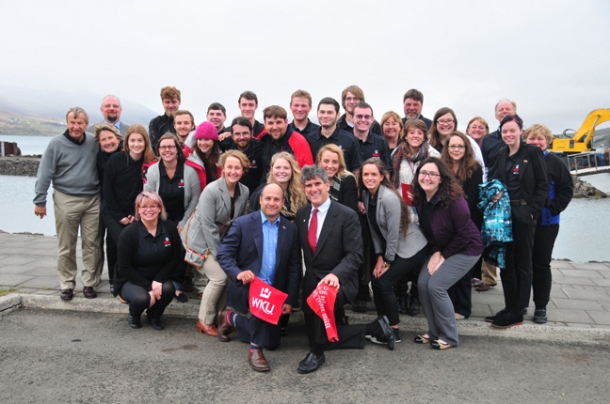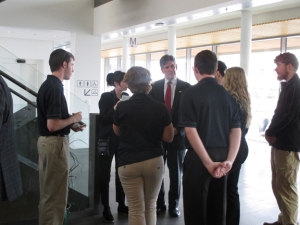Biology
WKU group participates in Arctic Council Roundtable in Iceland
- Wednesday, July 15th, 2015

Ambassador Stewart Wheeler of Canada and Robert Barber of the United States (front) posed with the WKU study abroad group in Iceland.
A group of students and faculty from WKU recently returned from a study abroad program in Iceland led by Dr. Bernie Strenecky, WKU Scholar in Residence, and Dr. Jason Polk and Dr. Leslie North of the Department of Geography and Geology. The course, co-taught with faculty from the University of Akureyri (UNAK), included the opportunity to participate in a landmark event that took place in Akureyri, Iceland, which is located at the northern gateway to the Arctic.
The WKU study abroad group received an invitation to a special ceremony, Arctic Roundtable: Passing the Torch and the Looking Ahead, held on June 2 that was jointly hosted by the United States Embassy, Canadian Embassy and University of Akureyri. The ceremony represented the Arctic Council collaboration and marked the transition of Chairmanship of the Council from Canada to the United States. The primary host representatives at the event included the Rector of the University of Akureyri, Ambassador Stewart Wheeler of Canada, and Ambassador Robert Barber of the United States. Other participants included Ambassador Árni Þór Sigurðsson, the Senior Arctic Official of Iceland, the Mayor of Akureyri, and several invited speakers that represented the various entities involved in Arctic Council programs for both the previous two years and the upcoming program to be chaired by the United States for the next biennium. The institutions that presented on their activities included the Protection of the Arctic Marine Environment (PAME), Iceland Arctic Cooperation Network (IACN), Conservation of Arctic Flora and Fauna (CAFF), Eyjafjordur Business Development Agency, and the Icelandic Arctic Chamber of Commerce, among others.
The Arctic Council, formed in 1991, is an intergovernmental entity that is comprised of the nations of Canada, Denmark, Finland, Iceland, Norway, Russia, Sweden and the United States. The Council serves as the international forum for cooperation and coordination among the Arctic nations for environmental and indigenous issues, as well as climate change, trade, transportation and other pertinent Arctic issues.

A large group of attendees participated in the Arctic Council Roundtable, held at the University of Akureyri. Seated at the table in front, (from left) Ambassador Robert Barber, Ambassador Stewart Wheeler, UNAK Rector Eyjólfur Guðmundsson, and Iceland Ambassador Árni Þór Sigurðsson (standing). (Photo courtesy of U.S. Embassy in Reykjavík)
The invitation for WKU to participate highlights another positive outcome stemming from the recent memorandum of agreement signed between WKU, the University of Akureyri and Iceland Arctic Cooperation Network. The partnership is timely in being at the forefront of being able to engage students and faculty in relevant issues being dealt with at the global level stemming from climate impacts and Arctic geopolitical and geoenvironmental changes.
The Roundtable Ceremony in Akureyri presented a rare and unique opportunity for WKU students to witness and participate in such an event and see firsthand the importance of cooperation between governments, as well as the recently established relationship between WKU, UNAK and the IACN. They participated in group discussions about the Council programs and learning that took place during the previous two years under the Chairmanship of Canada, as well as learned about the exciting new opportunities and cooperation planned for the next several years under the Chairmanship of the United States.
The United States will focus on three main priorities during its tenure as Chair of the Council. U.S. Secretary of State John Kerry set forth these priorities in April when he formally accepted the transfer of the Chairmanship in April at the Arctic Council ministerial meeting in Iqaluit, Nunavut in Canada. These priorities include continued strengthening of the Council as an intergovernmental forum; introducing new long-term priorities into the Council; and raising Arctic and climate change awareness within the United States and across the world.
During the ceremony in Akureyri, UNAK Rector Eyjólfur Guðmundsson commented on the positive cooperation between Canada, Iceland and the U.S. as an example for moving forward in the coming years, including when Iceland takes on the Chairmanship in 2021. Following that, Ambassador and Senior Arctic Official of Iceland, Árni Þór Sigurðsson, commented on the importance of continuing the positive cooperation under U.S. leadership over the next two years and the significant role of the town of Akureyri will play as an international hub and leader for these activities.
After presentations from the Canadian Ambassador and institutions that worked on projects under its tenure as Council Chair, Ambassador Barber welcomed the audience on behalf of the U.S., with a special welcome to the WKU students. “By participating in this event, evidencing your interest in the critical issues that are being discussed, working with your peers here in Iceland…these things make you ambassadors of the United States,” he said. “What you do when you get home will make a huge difference all the way around. Thanks for your work and for representing our country.”
U.S. Ambassador Barber wrapped up by saying, “The Arctic nations must draw on all sectors, including academia, civil society, government, business, NGOs, and others in order to make a lasting difference in the Arctic. I’m hopeful that we shall.”
Following his comments, presentations were made from representatives about the goals of the U.S. for the next two years as Chair of the Arctic Council. One of the representatives was WKU faculty member and study abroad course co-leader Dr. Polk, who was invited by U.S. Ambassador Barber to represent the university perspective for the United States with regard to climate change and the priorities set forth by Secretary Kerry. Ambassador Barber introduced Dr. Polk: “It’s not just the U.S. government who is working on these priorities, but also how our universities, including the University of Akureyri, are taking on the challenge of gaining new knowledge to find solutions to mitigate the effects of climate change.”

Dr. Jason Polk presented on a U.S. university perspective on the importance of partnerships in climate change work in the Arctic at the Roundtable ceremony, highlighting the recent WKU-UNAK-IACN agreement and work as a productive example. (Photo courtesy of U.S. Embassy in Reykjavík)
Dr. Polk gave a talk titled “The Power of Partnerships in Science and Communication to Address the Global Climate Change Challenge: A U.S. University Perspective” and spoke of the importance of international cooperation, building partnerships, and opportunities for students who will become the new leaders in these fields. He emphasized the need for students to understand the global connections and impacts from a changing Arctic, particularly from the influence of climate variability, and illustrated the important role universities play in working and liaising with governmental entities, businesses, and non-profit groups to find solutions. Dr. Polk described the efforts that WKU is putting forth toward that goal, as an example, and highlighted the successful outcomes from the recently signed agreement between WKU, UNAK, and the IACN in March of this year. “In a very short time, we have already made progress on our goals, including the students participating in the course in Iceland and holding a research workshop to identify and develop collaborations to address the most pressing issues. We will continue to work toward finding solutions by engaging our students through applied learning and research with our partners,” Dr. Polk said.
Graduate student Robert Schaefer was a participant in the course and Roundtable Ceremony. “It was inspiring to see people of different countries, origins, and expertise working together toward the common goal of protecting the Arctic in the face of a changing climate,” he said. “This event was a turning point for me in learning how much of a global issue climate change is and the importance of the Arctic in that process, particularly the need for cooperation and partnership, and that even as a student I can make a difference.”

Ambassador Robert Barber engages in discussion with WKU students during the Arctic Council Roundtable reception.
Following the ceremony, a reception was hosted by the Canadian Embassy, then Ambassadors Wheeler and Barber joined the WKU students and faculty for a hosted dinner. During the dinner, students were able to interact with the Ambassadors and learn about the role of the State Department in foreign affairs and have further discussions about the Arctic and the future goals of the Arctic Council, including opportunities for students to get involved. The Ambassadors were presented with red towels to symbolize making them part of the Hilltopper family and they encouraged the continued involvement of WKU in addressing Arctic and global environmental challenges and to maintain the path of being at the forefront of some of the most pressing issues facing the world right now.
Contact: Jason Polk, jason.polk@wku.edu
Some of the links on this page may require additional software to view.

